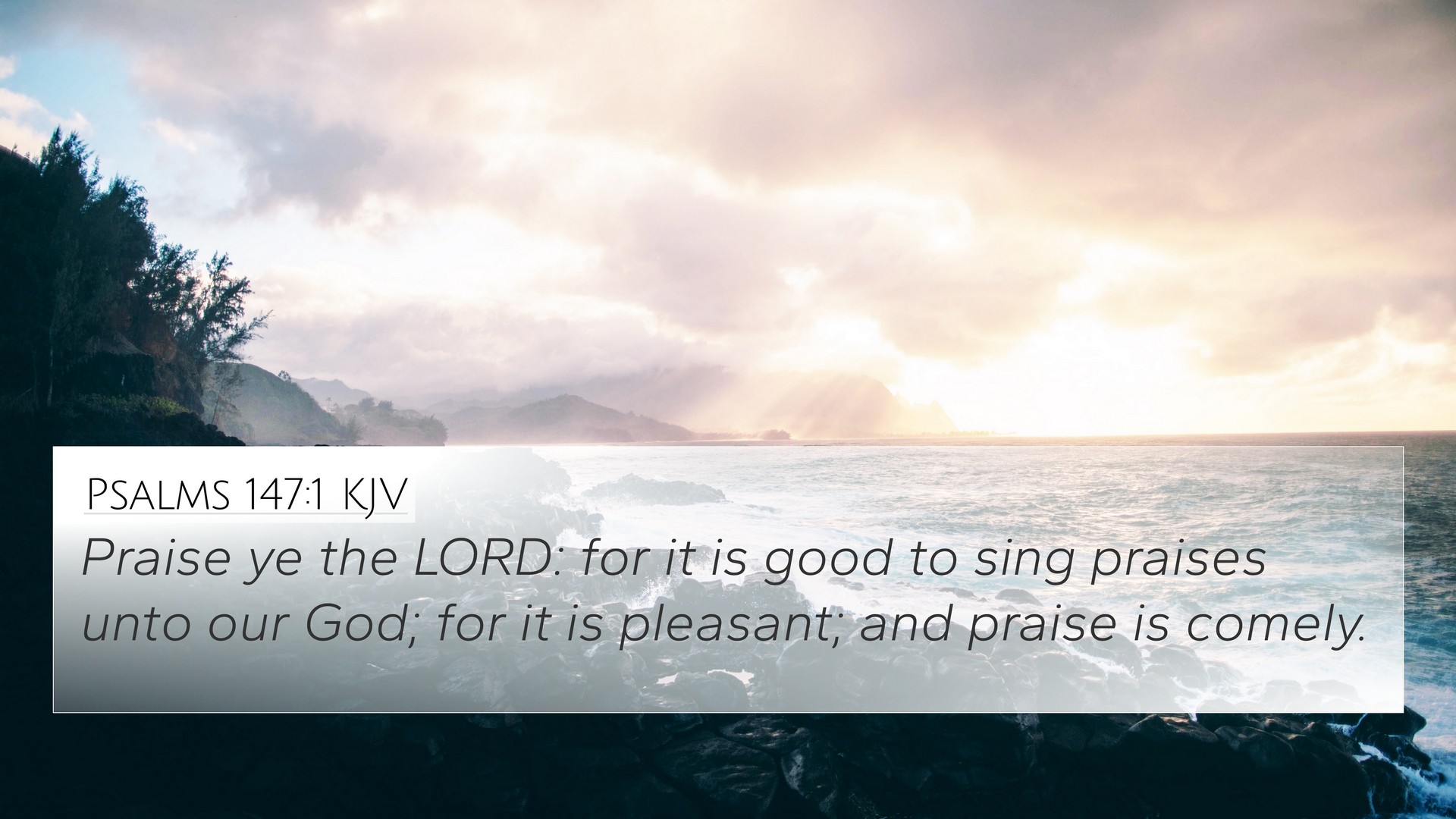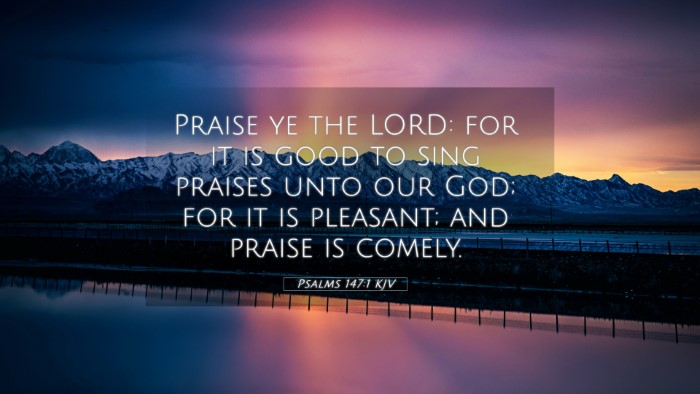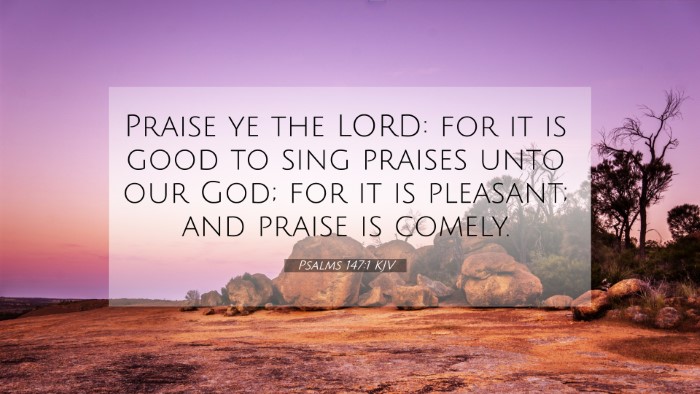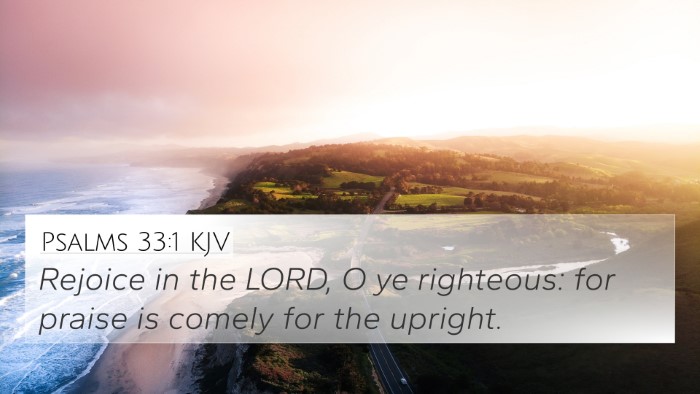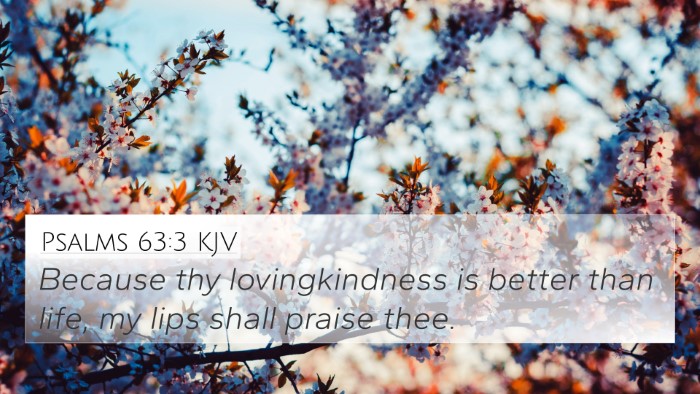Psalms 147:1 - Understanding the Verse
Psalm 147:1 states: "Praise the LORD! For it is good to sing praises to our God; for it is pleasant, and a song of praise is fitting." This verse emphasizes the importance and value of worshiping God through song and praise, which is a recurring theme throughout the Bible.
Meaning and Insights
This verse bears significant theological implications, which have been explored in-depth by various public domain commentators such as Matthew Henry, Albert Barnes, and Adam Clarke.
Matthew Henry's Commentary
Matthew Henry emphasizes that praising the Lord is not just a duty but a delight. He notes that it is an act that uplifts both the individual and the community. He discusses how singing praises serves as a reminder of God's goodness and mercy, allowing believers to express their gratitude and acknowledgment of His greatness.
Albert Barnes' Commentary
Albert Barnes reflects on the nature of praise, noting that it is appropriate for God's people to engage in worship. He mentions that praising God is a form of acknowledgment of His attributes and deeds. Furthermore, Barnes emphasizes the goodness tied to worship, suggesting that it brings joy and peace to those who participate in it.
Adam Clarke's Commentary
Adam Clarke highlights the emotional and spiritual benefits derived from praising God. He points out that singing is a natural part of spiritual expression that resonates with the human experience and that God delights in the worship of His followers. Clarke also connects this verse to the idea that true praise is both "good" and "pleasant," reinforcing the joy found in worship.
Cross-References to Psalms 147:1
- Psalms 100:1-2: "Make a joyful noise to the LORD, all the earth! Serve the LORD with gladness! Come into his presence with singing!"
- Colossians 3:16: "Let the word of Christ dwell in you richly, teaching and admonishing one another in all wisdom, singing psalms and hymns and spiritual songs, with thankfulness in your hearts to God."
- Psalms 103:1: "Bless the LORD, O my soul, and all that is within me, bless his holy name!"
- Isaiah 42:10: "Sing to the LORD a new song, his praise from the ends of the earth..."
- Ephesians 5:19: "Addressing one another in psalms and hymns and spiritual songs, singing and making melody to the Lord with your heart."
- Psalms 98:1: "Oh sing to the LORD a new song, for he has done marvelous things!"
- Psalms 30:4: "Sing praises to the LORD, O you his saints, and give thanks to his holy name."
- Psalms 149:1: "Praise the LORD! Sing to the LORD a new song, his praise in the assembly of the godly!"
- Psalms 66:2: "Sing the glory of his name; give to him glorious praise!"
Thematic Connections
The verse underlines the interconnectedness of various Biblical texts that encourage worship and praise as vital components of the believer's life. This creates a rich tapestry of understanding regarding how to articulate feelings of love, gratitude, and joy towards God.
Tools for Cross-Referencing
Understanding the connections between Bible verses can be deepened through various tools for Bible cross-referencing. These include:
- Bible Concordance: A useful tool to find where particular words or phrases occur in Scripture.
- Bible Cross-Reference Guide: Resources that help track similar themes or teachings across different books of the Bible.
- Cross-Reference Bible Study: Methods that encourage engaging with multiple passages simultaneously.
- Bible Chain References: Systems that show relational links between verses to aid in deeper study.
- Comprehensive Cross-Reference Materials: Books or tools that compile various connections for easy access during study.
How to Use Cross-References in Bible Study
Using cross-references effectively allows for a more nuanced understanding of Scripture. Here are some methods:
- Identifying Connections Between Old and New Testament: Look for parallels in themes and messages that enhance comprehension.
- Comparative Study of Pauline Epistles: Analyze shared ideas found in the letters of Paul to enrich insights.
- Links Between the Prophets and Apostolic Teachings: Explore how prophecies are fulfilled or interpreted in the New Testament.
- Cross-Referencing Psalms with New Testament Teachings: A study method that reveals how Psalms are quoted or alluded to in the New Testament.
- Preparing Sermons with Cross-References: Helps in structuring messages that reflect the broader Biblical narrative.
Conclusion
Psalms 147:1 is more than just a call to praise; it encapsulates the joy and duty of worship in the believer's life. By understanding this verse through various commentaries and cross-referencing it with related scriptures, we unveil a rich tapestry of Biblical truth that encourages deeper appreciation and engagement with our faith.
